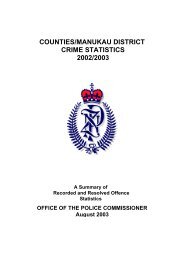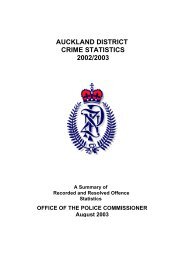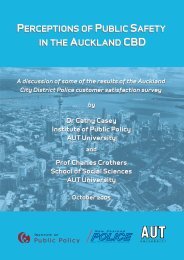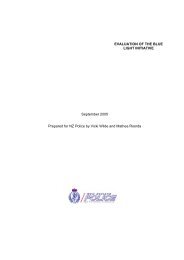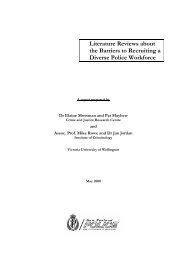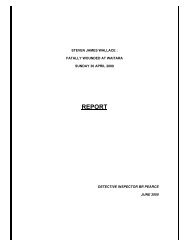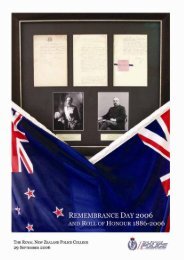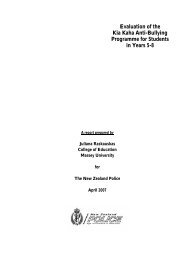Police Perceptions of Maori - Rethinking Crime and Punishment
Police Perceptions of Maori - Rethinking Crime and Punishment
Police Perceptions of Maori - Rethinking Crime and Punishment
You also want an ePaper? Increase the reach of your titles
YUMPU automatically turns print PDFs into web optimized ePapers that Google loves.
Summary <strong>and</strong> discussion<br />
The seventy five percent response rate for this survey is satisfactory, especially when<br />
compared with market research surveys <strong>and</strong> other recent surveys within the police<br />
which, in the last few years, have rarely obtained response rates above 60%. The 737<br />
respondents largely comprised those with at least 5 years service who were currently<br />
or recently engaged in front line duties. The sample, although not representative <strong>of</strong> the<br />
New Zeal<strong>and</strong> population as a whole with respect to sex or ethnicity, appears to be<br />
representative <strong>of</strong> the New Zeal<strong>and</strong> <strong>Police</strong> ranked at senior sergeant or below in these<br />
respects allowing for the booster sample <strong>of</strong> women. Only 8% <strong>of</strong> the sample identified<br />
as <strong>Maori</strong> although another 6% identified as having some <strong>Maori</strong> ancestry <strong>and</strong> 18% were<br />
women. The inclusion <strong>of</strong> an additional sample <strong>of</strong> women among the particpants is<br />
unlikely to have affected the balance <strong>of</strong> responses. The booster sample <strong>of</strong> those at the<br />
level <strong>of</strong> sergeant <strong>and</strong> senior sergeant may have resulted in slightly more favourable<br />
responses on <strong>Maori</strong> issues.<br />
In going about their work, police <strong>of</strong>ficers reported that, for the most part, <strong>Maori</strong> <strong>and</strong><br />
non <strong>Maori</strong> were treated similarly. A greater tendency to suspect <strong>Maori</strong> <strong>of</strong> an <strong>of</strong>fence<br />
was reported by about a third <strong>and</strong> nearly half reported that police <strong>of</strong>ficers generally<br />
were more likely to query vehicle registration when a <strong>Maori</strong> was seen driving a ‘flash’<br />
car. However, many respondents commented that policing behaviour was more related<br />
to other factors such as context <strong>and</strong> attitudes than to ethnicity.<br />
At least two thirds reported that they had heard colleagues using racist language about<br />
suspects or <strong>of</strong>fenders. Much <strong>of</strong> this was in private rather than face to face with<br />
<strong>of</strong>fenders <strong>and</strong> suspects. However, as some respondents commented, adverse effects<br />
are likely to arise from the use <strong>of</strong> racist terms, either privately or publicly. The data<br />
also suggest that, on average, almost one in four police <strong>of</strong>ficers have negative attitudes<br />
to <strong>Maori</strong>. A similar proportion <strong>of</strong> police <strong>of</strong>ficers were seen as having negative<br />
attitudes to Pacific Isl<strong>and</strong> <strong>and</strong> Asian peoples. On the whole, there may have been some<br />
decrease in negativity toward <strong>Maori</strong> over recent years but most respondents thought it<br />
had stayed the same.<br />
The survey shows that discriminatory language <strong>and</strong> behaviour are part <strong>of</strong> the police<br />
occupational culture. But this is not surprising given overseas research on police<br />
cultures <strong>and</strong> the evidence <strong>of</strong> racist attitudes in the wider New Zeal<strong>and</strong> society. In<br />
terms <strong>of</strong> the amount <strong>and</strong> extent <strong>of</strong> discrimination, however, it is not possible to<br />
compare the findings here directly with other studies <strong>of</strong> police overseas, with the views<br />
<strong>of</strong> other occupational groups in New Zeal<strong>and</strong> or with the rest <strong>of</strong> New Zeal<strong>and</strong> as a<br />
whole.<br />
Questions can <strong>and</strong> should be asked about the accuracy <strong>of</strong> police self report as a method<br />
<strong>of</strong> establishing what is actually occurring. It can be suggested that these results<br />
underestimate discriminatory behaviour because many police <strong>of</strong>ficers will have<br />
responded in ways that are consistent with presenting a good image <strong>of</strong> themselves <strong>and</strong><br />
their colleagues. Others with negative attitudes may have failed to respond. It would<br />
indeed be surprising if, to some extent, these figures are not an underestimate <strong>of</strong><br />
negative behaviour <strong>and</strong> attitudes within the police. And there is undoubtedly a gap<br />
between the overall presentation by the police <strong>of</strong> their own behaviour <strong>and</strong> that reported<br />
in the studies <strong>of</strong> <strong>Maori</strong> views <strong>of</strong> the police reviewed earlier. There is no easy way <strong>of</strong><br />
33



